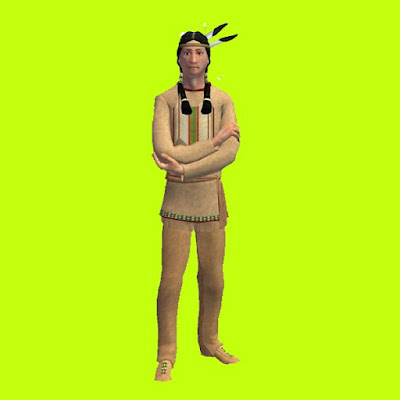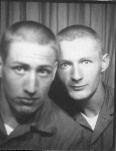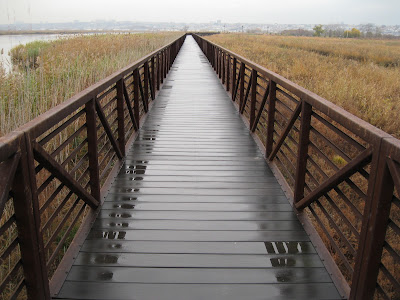Chapter18 A friendly warning
I tried to read to get through the boredom of the miles,
never fully appreciating how wide America was until having it rumble under the
wheels of the bus.
How did the pioneers endure it traveling at ten miles an
hour rather than 60, mile after mile after mile passing by the window, looking
– for the most part – primarily the same.
Inside the bus, the other passengers looked as bored as I
felt, some staring out at the empty space of the roadside in search of some
easy distraction. Others dosed or read or talked in whispers to their seat
mates, the content I did not catch.
At Catoosa, we were greeted by a huge, blue whale made of
stone and a sign called it The Big Blue Whale, a water attraction that featured
an open mouth displaying its teeth, a big white eye, a hole on top, and a
series of holes along its forehead, with a gap in the back, and a water slide
out its side. No water showed around it anywhere nor splashing kids. Perhaps it
was the wrong season, yet I got the feeling from seeing it and the paint now
beginning to peal that it was one of those symbols of a fading era that had
long ago seen its heyday and was now floating away into the past, taking with
it fond childhood memories of those who had passed here previously.
When we rolled into Tulsa I felt a rush of relief, another
city accomplished, another milestone on the trek west, making me feel like a
pioneer after all. No covered wagon. No threat of Indians. No harsh weather.
But endurance just the same and the sense that I had put many more miles between
where my family would expect me to be and where I actually was, making it much
more difficult to them to follow my trail.
Outside, The Metro Diner clock had the wrong time. The sign
for Wolf-Robe's Indian Trading Post said they were the makers of handmade
personalized jewelry waited to serve us.
The stucco building, painted with images of cowboy and
Indian life, had head of an Indian in full feathered hat above the arch like
doors. Just down the road, we saw the Will Rogers Motor Court, its neon sign
blinking off and off, highlighting the nearly urban sense the town provided
after miles of flatlands.
We passed the Tulsa
Monument company, a white building with a clock tower and a patch of head
stones in front, looking as much like a mausoleum itself, and then the Boston
Avenue Methodist church. This was a remarkable building constructed so that its
stark lines shot straight up. In some ways it looked like a dozen rocket ships
just ready to launch, with an empire state building like tower tallest at its
center.
Then we passed out of
Tulsa and back into the wide sky country. I kept telling myself that this was
the wild west, but it looked less wild than it did stark, and I felt oddly
small as the bus crawled along the highway, inching like a worm across the
miles, the hugeness of the place the real and foreboding element I did not
expect to find here.
We passed through places like Depew, where telephone poles
and weeds seemed dominate the roadside, these later growing into rolling,
tree-lined roads of Lincoln County. I saw a string of prefab houses that looked
good now but would eventually decay and quickly, then an old barn in Chandler,
with a roof top advertisement for Merrimac Caverns, for traffic going to the
other East, again a reminder of Jesse James. At intervals, I caught a glimpse
of Phillips 66 gas stations, and stained attendants filing the tanks of large
pickup trucks.
At Acardia, we came upon a huge round barn built in the last
century, sitting amid a sea of flowers. The wooden sides pealed their planks
and the roof shed its shingles, giving the impression of a man going bald. Even
its wide windows looked like bright eyes.
Finally, the bus pulled into Oklahoma City. We saw a rib
joint as we entered the city with a huge bottle of milk on its roof, standing
along, triangular shaped at the angled intersection of two roads, but we didn't
stop there. The bus station looked like others we had seen on the road, but we
still dragged ourselves down the aisle and out into the dry warm air, searching
for rest rooms that didn’t vibrate. I sought out cigarettes and then some
coffee.
Mrs. Warton did not
exit with the rest of us, choosing to sleep through this stop.
Bill, however,
touched my shoulder when we got into the bus station.
"Follow me, boy," he said and led me towards the
counter to the right where a sleepy waitress tried to suppress a yawn, as she
stirred to action with the sudden, unexpected flood of customers. Bill and I
sat on round stools at the counter. We both ordered coffee, and I ordered a pack
of Kools cigarettes. Bill looked concern.
"What are you
running away from, boy?" he asked me.
I could have been no
more shocked than if the real Col. Sanders had popped up to ask me if I was the
long-lost heir of President Jefferson Davis and threatened to hang me for war
crimes committed during a conflict more than a century earlier.
"I -- I don't
know what you mean," I said, struggling to bring some order to my clearly
chaotic facial expression, knowing that my terrified stare and my gaping mouth
had already confirmed the worst of his suspicions.
"Of course
not," he said, and took a large black cigar from a container kept in his
inner jacket pocket. He bit off the tip, spat it into an ashtray, then lit the
thing, puffing billows of smoke before he was satisfied with the light.
"You've come this far without anyone guessing your little secret, it
wouldn't do for you to go giving it all away, just because someone like me
happened to guess lucky."
"Maybe I should
have my coffee outside," I said and rose to leave, only to have him grab
my arm.
"Don't go,"
he said. "I'm not going to tell anybody anything. Haven't I already said
I've had my own wild youth? And I'm good at keeping secrets. I've kept them all
my life. Most of what I've told you back in the bus, my wife doesn't know. To
her, she's always been the first, and I've always played the part of a bumbling
husband for her."
"She doesn't
know anything?"
"Maybe she's
guessed a thing or two, but I've never let on. It's a lie we're both
comfortable with. Since I've confided in you, I figured I'd let you know that
I've sensed something wrong about you since our leaving Philadelphia, that
spirit of a hunted man that I remember fairly well from my own youth. Sit down,
have your coffee, talk to me about it if you wish."
My hands shook as I lit my cigarette, the sharp menthol
working its way deep into my lungs, soothing something inside of me that I
hadn't known needed soothing.
"I didn't know
for sure about anything until we got to Pittsburgh, though I watched you,
noting how you seemed all preoccupied with the other cars, glancing back so
often I started glancing back, too, half expected to find someone following the
bus the way you must have expected.
"Then, when you
didn't take the bus north to Chicago, and kept on with us, I knew you were up
to something and thinking about pulling a fast one on somebody. Then, you got
real queer when that funny fellow started staring at you from the back of the
bus, the man that got off in Cincinnati, then got right back on a few miles
later. You started twitching like you thought he was a police officer. While I
don't know what he was, I know he was no cop. At least, they didn't find a
badge on him when they carted his body off. But they did find a gun."
Bill stared at me through the smoke as if trying to evaluate
my reaction, and though I tried to control myself, I must have jerked a little,
because he nodded slowly.
"Look, boy, I'm
not bothering you because I want to know what you've done so much as needing to
warn you to keep to your original plan, don't get side tracked by any
temptation."
"I don't
understand what you mean," I said.
"That floozy of
a hostess," he said, waving his cigar in the general direction of the bus.
"She ain't worth your time, and she's bound to get you in a peck of
trouble if you go off tramping with her. You obviously had a reason for keeping
on our bus instead of going north like your ticket said you should. I won't
question your instincts about that. But if you made up your mind on Los
Angeles, with some intention of doing something after that, stick to your plan.
Don't get off with this bitch or you'll be sorry."
"I wasn't really
thinking to..."
"Yes, you
were," Bill said sharply. "I saw the look in your eye, that sense of
infatuation. And while I might take that bitch for a rumble if I was still a
young man, you're not me and you'd get yourself in deep trouble over her, doing
something stupid like falling in love with her when all she's worth in a one
night's tumble in a cheap hotel."
No one had ever
talked so openly to me before, not even my gay Uncle Harry, who boasted of his
infidelities in suggestive hints, and never warned me off any indiscretion,
especially if he could join me in one.
"I'll think
about what you told me," I said, gulped down coffee that was still too
warm, then rose to go, catching sight of Caroline as she made her way out of
the lady’s room. She didn't see me. She was blowing kisses at the driver as she
made her way out the front door and out to the bus.
The driver settled
near us at the counter and ordered coffee.
"So, what's on
the schedule, captain," Bill asked with a laugh.
The driver glanced
up, his weary face struggling with a smile. "Next stop Amarillo," he
said. "That's when I can get myself some sleep."
"With her?"
Bill asked, thick white brows rising like question marks on his forehead.
"Heavens
no!" the drive said and shuddered. "I wouldn't get caught anywhere
outside the bus with that girl. She's pure trouble. She's got her hands down
more pairs of pants than a tailor. I'll flirt with her on the road, but I
wouldn't put nothing I valued in her hands. She might cut my balls off and sell
them for scrap."
The driver gulped
down his coffee hot, rose, and with a sigh said: "It's time to go,
gentlemen."




Comments
Post a Comment